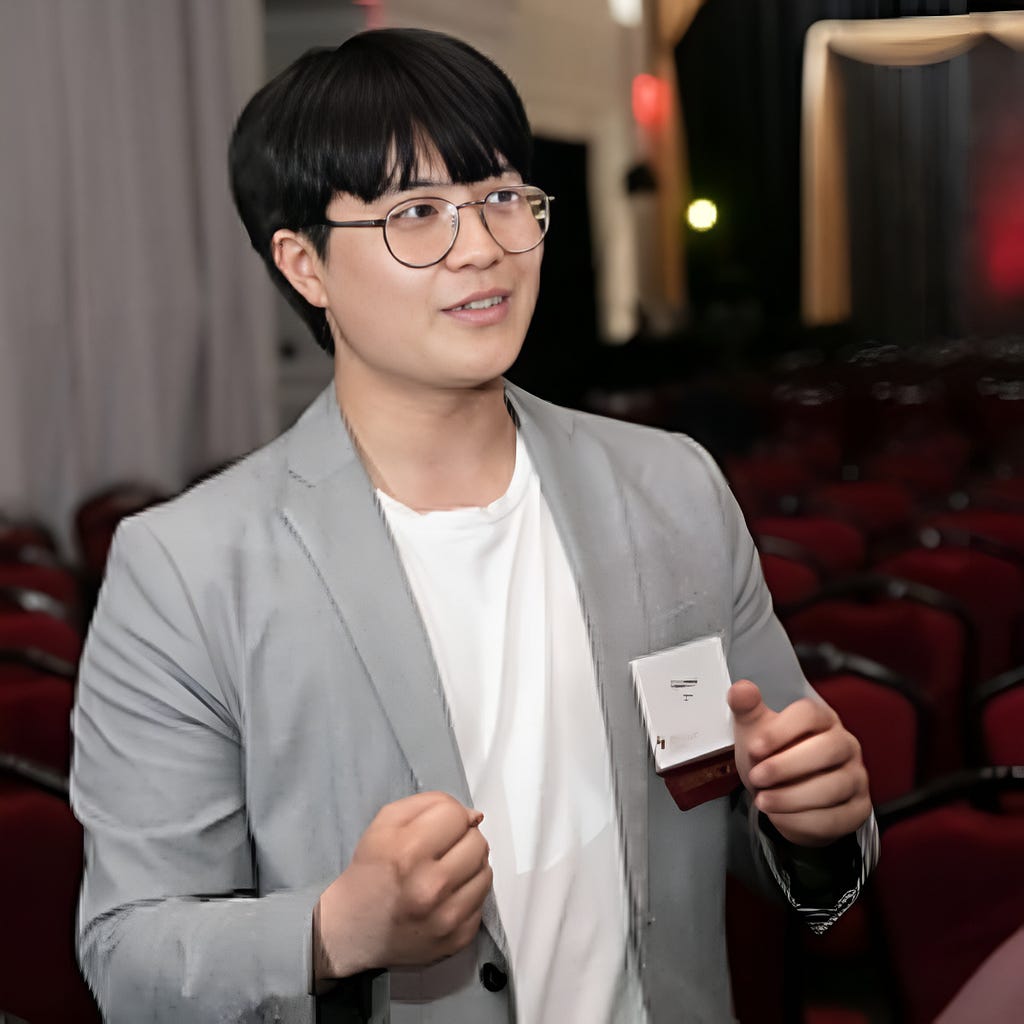An Interview with Eden Gold
People Who Believe in You: You can’t succeed alone. You need people who believe in you — whether they’re co-founders, advisors, investors, or your first customers. I wouldn’t be here without my team, who trusted me and took a leap of faith by joining from the start.
The entrepreneurial landscape is more vibrant and challenging than ever, with young entrepreneurs at the forefront, driving innovation and redefining the boundaries of success in the business world. These dynamic individuals are not only creating new products and services but also building sustainable business models that thrive in today’s fast-paced, technology-driven environment. Their journeys are filled with lessons of resilience, strategic innovation, and the relentless pursuit of growth.
As part of this series, we had the pleasure of interviewing Thomas Noh.
Thomas Noh is the founder of Sociable AI, a platform that trains AI on brand voice to automate personalized social media interactions. He launched the company in 2023 while studying at the University of Maryland, College Park. After a year of development, Thomas and his team relocated to Tennessee to join Brickyard, an incubator for hyper-focused founders.
Before Sociable AI, Thomas worked closely with virtual influencers and digital marketing efforts. He noticed that available marketing automation tools sounded like “bots,” failing to create a pleasant customer experience. This inspired him to build a way for brands to deliver personalized interactions at a scale, helping brands become more memorable to their audiences.
Thank you so much for joining us in this interview series. Before we dive into our discussion about cultural sensitivity, our readers would love to “get to know you” a bit better. Can you share with us the backstory about what brought you to your specific career path?
I hated school. I always got more out of learning by actually doing things. By the time, I was in high school, I started taking the initiative to understand what my true passion was instead of relying on standardized textbooks. I tried all sorts of things, from launching an e-commerce store to cooking at restaurants to trading stocks.
Through these experiments, I discovered that I loved creating things that made a lasting
impression on others. So, naturally, I was drawn to marketing — it allowed me to use creativity as a medium to deliver messages and capture people’s attention to create these lasting impressions.
Around the time GPT-3 came out, I was working for a cosmetic company doing just that, where I learned to use the LLM to automate marketing engagements. It was then that my “aha” moment hit me: regardless of how advanced an LLM is, people struggle to make it sound natural. That’s why, even years after ChatGPT launched, AI is mostly used for drafting and brainstorming and still requires a human touch.
But I knew that it didn’t have to be that way. With the right technical skills, one could feed in enough conversational data and train an LLM to match a particular writing style and behavior. That idea was the start of Sociable AI. I wondered what would happen if anyone could create a custom AI that could think and sound exactly the way they need to engage with their audience at scale.
Can you share the most interesting story that happened to you since you started your career?
I went to a conference with just one idea and a few customers willing to pay for a “service” that didn’t quite exist yet. The event included a rapid-pitch session where 100 startups had 1 minute to pitch, with the top 10 moving on to pitch in front of a group of VCs.
Somehow, I ended up winning the first round of pitches. I pulled an all-nighter to create my first-ever pitch deck for the final round the next day. I didn’t secure any investment at the time, but I reached out to one of the VCs exactly a year later when I finally had a product and my first 10 customers. That’s how we got our first investment.
Looking back, it was an awful pitch, and the deck looked horrifying.
You are a successful individual. Which three character traits do you think were most instrumental to your success? Can you please share a story or example for each?
Perseverance: During college, I averaged 3–4 hours of sleep a night. I was balancing my academic responsibilities, a part-time job to support myself, and my startup. This totally wrecked my health at the time, and I still haven’t fully recovered. My goal was to grow my startup enough to work on it full-time after graduation. It was a race against time, and I won.
Compassion: Building a team and a culture requires compassion. My philosophy is that if the founder genuinely cares about the team, the team will care about the founder’s vision. Without a team that’s invested in the mission, it’s nearly impossible to make meaningful progress, foster transparency, and encourage ownership. Although I’m not perfect at it, I try to show I care and do what I can to lighten their load.
Curiosity: A combination of willingness to care and eagerness to learn is a powerful force. I like to surround myself with people I can learn from. Every customer interaction is an opportunity to learn something new about the industry. I’ve grown so much as a person in the last two years while building Sociable AI.
Ok, thank you for that. Let’s now jump to the primary focus of our interview about young entrepreneurs’ secrets to rapid growth and success. To start, how would you define success?
I define success by the amount of influence one has on society. Some individuals have a deep influence on a few people, while others have a small influence on a large number of people. Think about it — YKK is the most successful zipper company in the world, making 40% of all zippers. Most people interact with their products every time they go to the bathroom without even thinking about it or knowing their name. That’s influence.
What unconventional strategy did you employ that significantly contributed to your startup’s growth, and why do you think it was so effective?
No unconventional strategy — we just continuously listened carefully to our customers and tried our best to build a service that people love and need. We aimed to make our customers obsessed with our product. I will say — being a college student made it much easier to ask for people’s time to pick their brains.
Can you share a critical pivot point in your startup’s journey and how you navigated the decision-making process?
In the very beginning of Sociable AI, we started as a social media engagement automation platform. We soon realized we were building something that was “nice to have” rather than “need to have” for most people. So, we went back to talking to customers and pivoted based on their feedback. Now we have become a tool that automates revenue generating activities: social selling.
How do you balance the need for rapid growth with maintaining a sustainable and healthy company culture?
I think the most crucial part is to bring in team members who truly care. Most people join a startup not just for a job but because they resonate with the vision and want to contribute. When you have a talented group of individuals who are working towards the same goal, it brings a type of energy that is hard to match.
In what ways has your personal definition of success evolved since the inception of your startup?
It hasn’t, but being exposed to very influential people has definitely widened my perception on the spectrum of success.

Based on your experience and research, can you please share “5 Things You Need to Succeed as a Young Person in Business?”
- A Strong “Why”: Founders need to enjoy the journey, and that requires a strong purpose. If you don’t have a reason to wake up every day and work on your idea, it will be harder to succeed than for those who do. For me, I love creating things that create memorable experiences for others. Sociable AI allows me to do exactly that at scale, which is what drives me to stay committed.
- People Who Believe in You: You can’t succeed alone. You need people who believe in you — whether they’re co-founders, advisors, investors, or your first customers. I wouldn’t be here without my team, who trusted me and took a leap of faith by joining from the start.
- Grit: A startup journey is no joke — it takes grit to keep going through setbacks and emotional rollercoasters. At this point, everyone on our team has seen each other’s tears. I love it.
- Agility: Build fast, validate, iterate, and repeat. The first MVP or business model founders create almost never remains the same. Finding product-market fit takes time, and founders need to pivot before running out of resources.
- Ability to Sell: Selling is a task the founder can’t delegate at the start. You have to be able to sell your vision to your team, customers, advisors — anyone whose time or resources you want. The best way to validate your startup is to sell your value proposition before you build anything.
What is one piece of advice you would give to an aspiring entrepreneur that you wish someone had given you at the start of your journey?
Make mistakes fast. It’s crucial to invalidate as many assumptions as possible. Listen carefully for the faint signs of product-market fit and track your data — it’s your compass.
You are a person of great influence. If you could start a movement that would bring the most amount of good to the most amount of people, what would that be? You never know what your idea can trigger. 🙂
I once mentored some student entrepreneurs from prestigious universities in Korea. They were sponsored by the Korean government to learn about building startups. When I asked why they wanted to pursue a startup, they replied, “I want to build a startup to get hired by big companies like Samsung.” This mindset baffled me, but it’s sadly common.
I want to help people with potential learn to take risks and dream big.
How can our readers further follow you online?
You can find me on LinkedIn and Instagram! I am always down to connect with anyone who wants to chat!
Thank you for the time you spent sharing these fantastic insights. We wish you continued success in your great work!
About The Interviewer: Eden Gold, is a youth speaker, keynote speaker, founder of the online program Life After High School, and host of the Real Life Adulting Podcast. Being America’s rising force for positive change, Eden is a catalyst for change in shaping the future of education. With a lifelong mission of impacting the lives of 1 billion young adults, Eden serves as a practical guide, aiding young adults in honing their self-confidence, challenging societal conventions, and crafting a strategic roadmap towards the fulfilling lives they envision.
Do you need a dynamic speaker, or want to learn more about Eden’s programs? Click here: https://bit.ly/EdenGold
Startup Savvy: Young Entrepreneur Thomas Noh Shares Their Secrets for Rapid Growth and Success was originally published in Authority Magazine on Medium, where people are continuing the conversation by highlighting and responding to this story.
